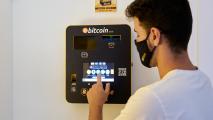
The Digital Frontier
30 years ago, the Internet opened up a new frontier, and today we’re all citizens of a digital Wild West, where how we live, work and govern is changing everyday.
More
Wearable health monitors help predict flu before symptoms start
A human challenge trial suggests that wearable health monitors could help predict flu and cold infections before symptoms appear.
These holograms are so real you can touch them
Researchers developed hologram technology that uses air jets to create physical sensations, giving users the ability to feel virtual objects.
Why employers might pay your parents to watch your kids
The Helpr app makes it easy for working parents to get their employers to pay for backup childcare provided by friends and family members.
Flying microchips the size of sand are tracking air data. Watch them fly.
Scientists have built the smallest artificial flying structures yet — gadgets that could one-day monitor air pollution and the spread of airborne diseases.
What does China’s crypto ban mean for the tech world?
The ban could lead to an exodus of Chinese crypto entrepreneurs and a diffusion of crypto technology in Southeast Asia.
This implanted microchip may one day control your sleep
An implantable, wireless device could be better than popping a pill.
Bitcoin is now ‘legal tender’ in El Salvador
If more countries follow, what will this mean for consumers and businesses around the world?
Crisis app for Afghans provides real-time updates on threats
Ehtesab, a crisis app for Afghans, uses crowdsourced data to provide real-time alerts to residents of Taliban-controlled Kabul.
Pandemic prompts surge in food sharing, app says
Food-sharing app Olio is combating food insecurity by making it easy for those with extra food to get it into the hands of those in need.
Uber may reduce drunk driving deaths by 6%
Uber is reducing drunk driving deaths by more than 6%, according to a new analysis, suggesting that ridesharing is making streets safer.
This eco-toilet pays for human waste in digital currency
The BeeVi eco-toilet turns human waste into energy – and pays for the privilege.
Snails wearing smallest computer solve extinction mystery
The world’s smallest computer was used to figure out why one species of snail survived a situation that pushed more than 50 others into extinction.
Volcanoes to power bitcoin mining in El Salvador
Now that bitcoin is legal tender in El Salvador, the nation is working to power bitcoin mining facilities with geothermal energy harnessed from volcanoes.
IBS treatment app helps patients reprogram their minds
An IBS treatment app that facilitates cognitive behavior therapy helped trial participants manage symptoms and improve their quality of life.
What it’s like to do a human challenge trial
Human challenge trials are risky, but they could help us avoid another prolonged pandemic.
Google unveils “magic window” for 3D video chat
Google’s Project Starline is a new 3D video chat technology designed to make online communication feel more like real life.
IBM's faster, more powerful microchips
IBM has unveiled the world’s first 2-nanometer microchips, a breakthrough in chip technology that could lead to faster devices that require less energy.
Stablecoins, CBDCs, and the future of money
What role would a Fedcoin play in the evolving landscape of digital currency?
How a smartphone app is helping suppress HIV
An HIV app that uses gaming elements to motivate people to stick to their ART regimen was able to increase viral suppression in a small study.
What’s at stake in the Epic vs. Apple trial
One of the biggest antitrust lawsuits in the history of Big Tech kicked off this week — here’s what you need to know.
Get inspired with the most innovative stories shaping the world around us.






















